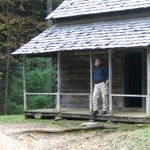The Alpha Site: Earth II
 Twenty light years from Earth, above a calm, dark ocean, a huge, bloated red sun rises in the sky - a full ten times the size of our Sun as seen from Earth. Small waves lap at a sandy shore and on the beach as something stirs. This very well may be the scene on what is possibly the most extraordinary world to have been discovered by astronomers: the first truly Earth-like planet to have been found outside our Solar System. The discovery of the planet, designated Gliese 581c, was announced today by a team of European astronomers, using a telescope in La Silla in the Chilean Andes.
Twenty light years from Earth, above a calm, dark ocean, a huge, bloated red sun rises in the sky - a full ten times the size of our Sun as seen from Earth. Small waves lap at a sandy shore and on the beach as something stirs. This very well may be the scene on what is possibly the most extraordinary world to have been discovered by astronomers: the first truly Earth-like planet to have been found outside our Solar System. The discovery of the planet, designated Gliese 581c, was announced today by a team of European astronomers, using a telescope in La Silla in the Chilean Andes.The Earth-like planet that could be covered in oceans and may support life is 20.5 light years away, and has the right temperature to allow liquid water on its surface. The new planet, which orbits a small, red star called Gliese 581, is about one-and-a-half times the diameter of the Earth, and is located in the constellation Libra.
Astrobiologists refer to a climate zone known as the Goldilocks Zone, where it is not so cold that water freezes and not so hot that it boils, but where it can lie on the planet's surface as a liquid. In our solar system, only one planet - Earth - lies in the Goldilocks Zone. Venus is far too hot and Mars is just too cold. This new planet lies bang in the middle of the zone, with average surface temperatures estimated to be between 32 and 102 degrees Fahrenheit. Lakes, rivers and even oceans are possible.
It is not clear what this planet is made of. If it is rock, like the Earth, then its surface may be land, or a combination of land and ocean. Another possibility is that Gliese 581c was formed mostly from ice far from the star (ice is a very common substance in the Universe), and moved to the close orbit it inhabits today. In which case its entire surface will have melted to form a giant, planet-wide ocean with no land, save perhaps a few rocky islands or icebergs.
The surface gravity is probably around twice that of the Earth and the atmosphere could be similar to ours. Although the new planet is in itself very Earth-like, its solar system is about as alien as could be imagined. The star at the centre - Gliese 581 - is small and dim, only about a third the size of our Sun and about 50 times cooler. The two other planets are huge, Neptune-sized worlds called Gliese 581b and Gliese 581d (there is no "a", to avoid confusion with the star itself). The Earth-like planet orbits its sun at a distance of only six million miles or so, travelling so fast that its "year" only lasts 13 of our days. The parent star would dominate the view from the surface - a huge red ball of fire that must be a spectacular sight.
It is difficult to speculate what - if any - life there is on the planet. If there is life there it would have to cope with the higher gravity and solar radiation from its sun. Just because Gliese 581c is habitable does not mean that it is inhabited, but we do know its sun is an ancient star - in fact, it is one of the oldest stars in the galaxy, and extremely stable. If there is life, it has had many billions of years to evolve.
The real importance is not so much the discovery of this planet itself, but the fact that it shows that Earth-like planets are probably extremely common in the Universe. There are 200 billion stars in our galaxy alone and many astronomers believe most of these stars have planets.
Interestingly, Gliese 581c is so close to the Earth that if its inhabitants only had our level of technology, they could - just about - pick up some of our radio signals, such as the most powerful military transmitters. What would happen if we received a signal from them is unclear.
"There is a protocol, buried away in the United Nations," says Dr Shostak of the Search for Extraterrestrial Intelligence Institute in California. "The President would be told first, after the signal was confirmed by other observatories. But we couldn't keep such a discovery secret."
It may be some time before we detect any such signals, but it is just possible that today we are closer than ever to finding life in the stars.

